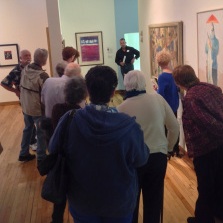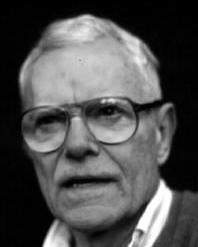John McIver (born 1930)
When former Hickory resident John McIver decided to donate two paintings to HMA in 2012, Kate Worm (then HMA's Collections Curator) interviewed him about his work. In McIver's own words, “After watercolor, all the other media were simple.” John McIver's Emerging #22 (2009) and Procession #21 (not dated) are mixed media works. They are two of four McIver pieces in the permanent collection.

John McIver, Emerging 22, mixed media, 2009
“[One] influence of mine was John Pike [who was a well-known watercolorist and illustrator]. He built a barn up in Woodstock NY [in 1960] and started holding classes there [until 1979]. He’s the only person I took lessons from. He had quite an effect, and it was a long way from painting like John Pike and the way I paint now, which is nonobjective.”
“For a while I was torn which way to go because the New York School [of abstract expressionist painting] was fashionable. Working with transparent watercolor was kind of dated. I have a great appreciation for watercolor and the representational way [but] I think that as I’ve gone along I’m more and more interested in all kinds of abstraction.”
John Kolb McIver (below right) was born in Jacksonville, FL in 1930. After graduating from Trinity College in Hartford, CT, he returned to Jacksonville where he taught himself to paint with watercolors and in turn taught others, at the Jacksonville Art Museum for one. He moved to Evansville, IN in 1967 where he lived until 1975, and then he lived in Grandville, MI before settling in Hickory in the 1990's.
In his early years as an artist, McIver was a realist. He later abandoned realism and says that he “went abstract” in 1993. As a general rule, McIver produces his paintings in series. At a 2005 exhibit at Charlotte's Modern Eye Gallery, he was described as "renowned for his previous work in watercolor, for which he has been awarded many honors. In this current body of work, he turns his expression to collage, and crafts energy-filled canvases of color, light, and texture. His work is reminiscent of delicate Japanese-inspired textiles." (Carolina Arts, May 2006)
At an Art of Poetry event at HMA in early 2014, Bud Caywood read his poem Procession which was inspired by McIver's Procession #21.

John McIver, Procession 21
Procession
There’s no description in the layered movement,
the steps, the quickness; even the ghosts are tired―
bones bent forward in a skin of wind,
leaning into impatience, into anxious unlifelike forms,
reaching for more than oxygen can give―
when the dog of work gnaws at the day’s short bone.
In the end, whenever you go, wherever you are,
you’re there.
(For other poems inspired by works exhibited at HMA, see http://artofpoetry.net/)
As an aside in his interview with artist Kate Worm, McIver observed about the museum that "I think it's neat that they took a high school building and turned it into a museum and the way it's done, particularly the stairway [into what] used to be the basketball court. I like the idea that [HMA] is free and I think this is nice in a community that has ways of being supported without charging admission."

This post is # 40 of the 75 stories to celebrate HMA's 75 years.
Post written by Karin Borei, former HMA Project Coordinator.

